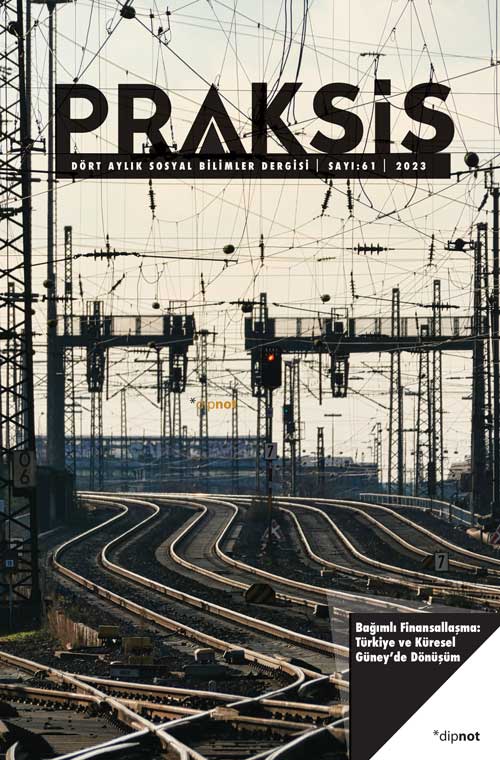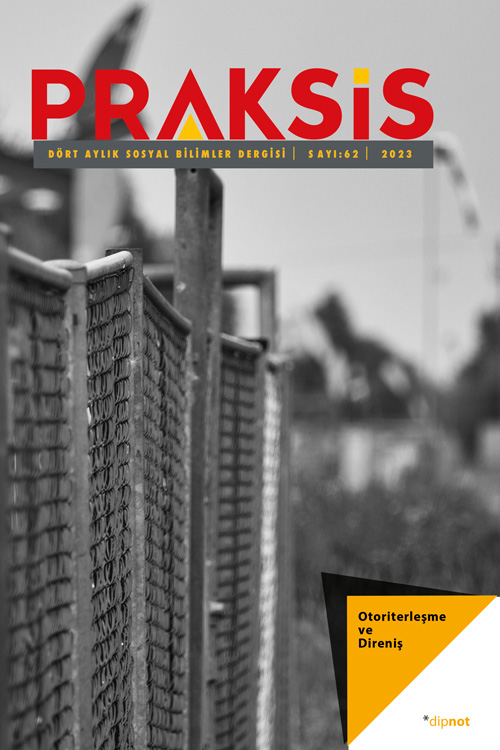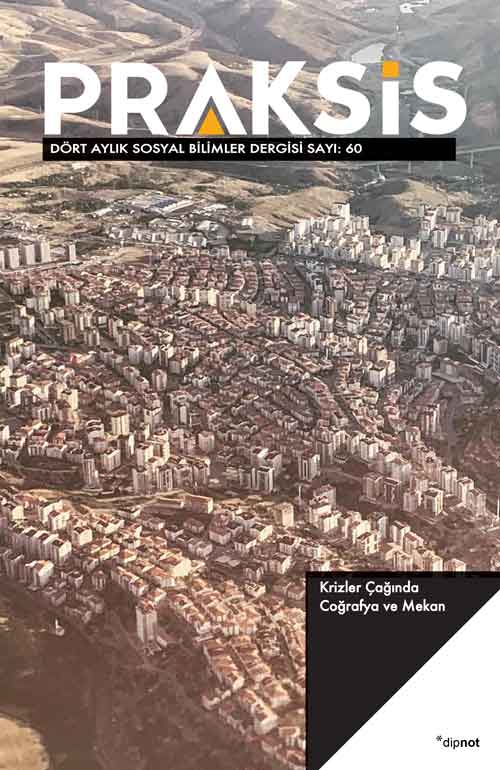The Undercurrent of Financialization in Turkey: Liabilities Sold at the Street Corners
Ferhat Akyüz
The institutional and legal structure of money and capital markets in Turkey was established between 1980-1983. Negotiable certificates of deposit in the 1980s, higher levels of issuance of private sector stocks and bonds in the 1970s, and Savings Bills issued in the 1960s served as precedents of money and capital market instruments of the following decades. For the government, the Savings Bills; for holdings/companies, the stock and bond issuance; and for the banks, the negotiable certificates helped access new resources via liability management of their balance sheets. Each practice contributed in varying degrees to different social segments becoming depositors. However, on the other hand, with these practices, bankers and usury became more visible, and they became more decisive in money and capital markets. This study uses quantitative and qualitative data, compiled by scanning the small advertisements page of the Milliyet Newspaper in certain routines for these three financial instruments from the 1960s to the early 1980s. This study aims to contribute to the financialization literature in Turkey providing a historical lens.
Keywords: Financialization, Savings Bills, Certificates of Deposit, Bankers, Banker Kastelli
Inner Connections between Manufacturing Industry and Finance in the Late Capitalistization Process: An Analysis on the Post-2001 Crises
Gizem Şimşek
The discussions on the concepts of financialization and financial dependence cause us to rethink capitalism through the experiences of late capitalistization. While rethinking capitalism, these prominent concepts should undoubtedly be considered together with the lived processes, namely historical periods. It is critical to highlight the specific experiences of capitalist societies that simultaneously face financial dynamics. This situation makes it meaningful to analyze the processes of articulation of late capitalist countries to world capitalism and, moreover, to think about financialization and financial dependency in Turkey from a framework that deals with the manufacturing industry with these two requirements. Moving from this framework, the study aims to establish the internal connections of the structural contradictions of production, which became concrete as imported input dependence in production goods in the phase of the capital accumulation process based on late capitalization in Turkey after the 2001 crisis, with the financial process, through the borrowing dynamics of the manufacturing industry. The recent practices of the manufacturing industry in Turkey after the 2001 crisis correspond to a phase in which borrowing in the form of foreign currency required for the import of production goods gained weight. When we deal with the manufacturing industry as two separate production categories as production of means of production (Department I) and production of consumption instruments (Department II), the concentration in Department II production, as a characteristic feature in late capitalist countries such as Turkey, leads to the need for more Department I. However, the structural limits brought by the late capitalistization and the specific historical conditions of the level of capital accumulation cause the manufacturing industry production structure to continue depending on Department I imports. For this reason, the production increases that continue without a structural transformation in the manufacturing industry, on the one hand, reveal the financing required for production in the form of debt capital, on the other hand, it increases financial dependence by creating an unbreakable debt spiral due to the inability of debt capital in the form of foreign currency to be transformed into productive capital investments. In this respect, the study approaches from a critical perspective to analyses that consider the fields of production and finance independently of each other. Based on the holistic functioning of capitalism, in which production and circulation stages are intertwined, establishing causal mechanisms that reveal the debt spiral in the manufacturing industry constitutes the main reference point of this study.
Keywords: Late capitalistization, manufacturing industry, capital need in the form of foreign currency, financialization, financial dependency
A CIA Report on Latin America’s Debtors’ Cartel Initiative: Cartagena Group
- Yağız Aygün
While going through a period that the world economy is facing the possibility of a major debt crisis, it is possible that the attempts of 11 debtor Latin American countries to form a debtors’ cartel after the Mexican crisis in 1982 can be considered as an important experience for today’s debtor countries. In 2002, a CIA report on the aforementioned initiative was published after being declassified. In this study, the conditions for the form a debtors’ cartel are evaluated by making use of the findings in the mentioned report. As a result, despite serious structural limitations similar to those in the 1980s; it has been argued that today’s conditions, in which the hegemony of the USA has receded and rival powers have not yet reached a position to replace the former hegemon, may allow the debtor countries to create a room for maneuver by taking advantage of the contradictions between the imperialists.
Keywords: Debtors’ Cartel, Creditors’ Cartel, Moratorium, Debt Crisis, Latin America
Peripheral Financialization and the Transformation of Dependency: A View from Latin America
Nadine Reis, Felipe Antunes de Oliviera
Translator: Dicle Nur Aktan
A key insight of dependency theorists such as Vania Bambirra and Ruy Mauro Marini was that dependency is not confined to an international relations phenomenon of unequal exchange, but plays out at the level of class relations in the periphery. While emphasising that financialization has exacerbated global uneven development, much of the peripheral financialization literatüre has disregarded the contributions of dependency theory, whose main object of discussion has precisely evolved around the uneven but combined nature of global capitalist development. Contributing to the pluralization and decolonization of IPE, we revisit dependency theory to analyse peripheral financialization and its political and social impact in Latin America. Drawing on case studies of Brazil and Mexico, we engage with the agency of Latin American ‘dominateddominant’ ruling classes in reconstructing dependency under financialized conditions. In both cases, power has shifted towards the financial and export-oriented fractions of ruling classes, while financialization has reproduced the key characteristic of dependent capitalism – the super-exploitation of labour. The article updates earlier periodizations of dependency and maps financialized dependence as a new phase of dependency, entailing substantial changes in the role of the state and class relations.
Keywords: Financialization, dependency theory, Latin America, Brazil, Mexico
“Emergency Preparedness” as an “Internal Pacification” Project, the Rise of the “Disaster/Emergency State” and the Case of Turkey since the 2010s
Biriz Berksoy
“Emergency preparedness” is a security rationality that prescribes incessant preparation and creation of coordination mechanisms among public/private institutions for swift and efficient intervention in the so-called “emergency intervals” caused by natural, technological, or human-induced events that are presumed to have the potential to turn into “catastrophes” and thereby, threaten the maintenance of social order. This article explores the socio-political reasons behind the frequent utilization of this security rationality within the daily lives of advanced capitalist countries such as the United States, United Kingdom and Canada towards the end of the 2000s and its adoption in Turkey immediately after the Gezi Resistance (2013) and 6-8 October Incidents (2014) leading to a comprehensive re-structuring process within its security dispositif including the founding of “Security and Emergency Coordination Centers”. The article argues that the prominence gained by this security rationality, which is increasingly employed in the mentioned advanced capitalist countries as an “internal pacification” project activating war power together with police power, is related to a new state form. This new state form is identified in the article as the “disaster/emergency state”. It has arguably emerged under the influence of growing fascist tendencies crystallizing amid the escalating economic/political crises in the aftermath of the 2008 global financial crises, the reconfiguration of the capital accumulation regimes as “militarized accumulation” and the burgeoning social protests/movements. In this post-9/11 period, as the assumption that any individual or “antagonistic politics” can turn into an “existential threat” has become decisive in the configuration of security policies, the political power is, pervasively, concentrated at the higher echelons of the executive, sovereign form of power, in the Foucauldian sense, operating through necropolitics has become dominant on a global scale and the notion of “emergency” has turned into a valuable power technology. Within this context, this new state form has arguably been fashioned by a militarist/belligerent governmental rationality and it prioritizes the unmediated and regular activation of “war power” that lies at the basis of “state of emergency” for the solution of social/political problems that are labeled as “existential threats” without resorting, each time, to its declaration.
Keywords: Disaster/Emergency State, social movements, police, militarization, Turkey
Possibilities and Limits in Hegel Philosophy: Hikmet Kıvılcımlı’s Reading of Hegel
Caner Selçuk Sevindik
This study mainly focuses on Hikmet Kıvılcımlı’s thoughts on Hegelian philosophy, based on his work Hegel and Philosophy Notes. This study, which shows importance in showing connection points between a left-socialist theoretician in 1960s and philosophy, will be examined in this study as a dialogue between Hegel’s writings and Kıvılcımlı’s understanding of those. That is to say that, in this study, prominent concepts in Kıvılcımlı’s commentations such as dialectic, reality, concept, state and history will be examined in the light of Hegel’s works such as Phenomenology of Spirit, Philosophical Sciences Encyclopedia and Legal Philosophy, Natural Rights and Political Science. Furthermore, this study resorts to commentary on Hegelian philosophy developed by Hungarian philosopher György Lukacs, Herbert Marcuse from the Frankfurt School, and Yener Orkunoğlu as well. This study’s main aim is to ascertain the emphases and deficiencies on Kıvılcımlı’s studies on Hegelian philosophy and Kıvılcımlı’s commentary on Hegel’s theses on state and history.
Keywords: Hegel, Dialectic, Reality, Verstand, Vernunft, State.
The Global Police State: Rethinking the Global Capitalism Theory in the Age of “Militarized Accumulation” and “Financialization”
- Gürsan Şenalp, Esra Şengör Şenalp
William I. Robinson is a prolific Marxist theorist who has produced numerous academic/political works since the late 1980s. His scholarly work became increasingly known in the 90s when the waves of globalization reached its peak. Yet, at the same time the world would have to deal with multidimensional crises. This paper engages in Robinson’s Global Capitalism Theory. In particular, we will do so in dialog with his book Küresel Polis Devleti (Ayrıntı, 2022). This book not only fully portrays the theoretical model developed by the author, but also focuses on the multidimensional “crisis of humanity” that has constantly deepened in the aftermath of the global financial crisis of 2008. Before moving on to what Robinson has to say in this book in light of the militarized accumulation and predatory financialization that characterize our times, we would like to take a brief look at the development of his theoretical model.
Keywords: Global capitalism theory, transnational capitalist class, global police state, militarized accumulation, financialization.
Book Review
Borçlandırma Siyaseti: Türkiye’de Finansal İçerilme
Berkay Ayhan
Toggle title
Toggle content goes here, click edit button to change this text.
Toggle title
Toggle content goes here, click edit button to change this text.
Toggle title
Toggle content goes here, click edit button to change this text.
Toggle title
Toggle content goes here, click edit button to change this text.
Toggle title
Toggle content goes here, click edit button to change this text.
Toggle title
Toggle content goes here, click edit button to change this text.
Toggle title
Toggle content goes here, click edit button to change this text.
Toggle title
Toggle content goes here, click edit button to change this text.




